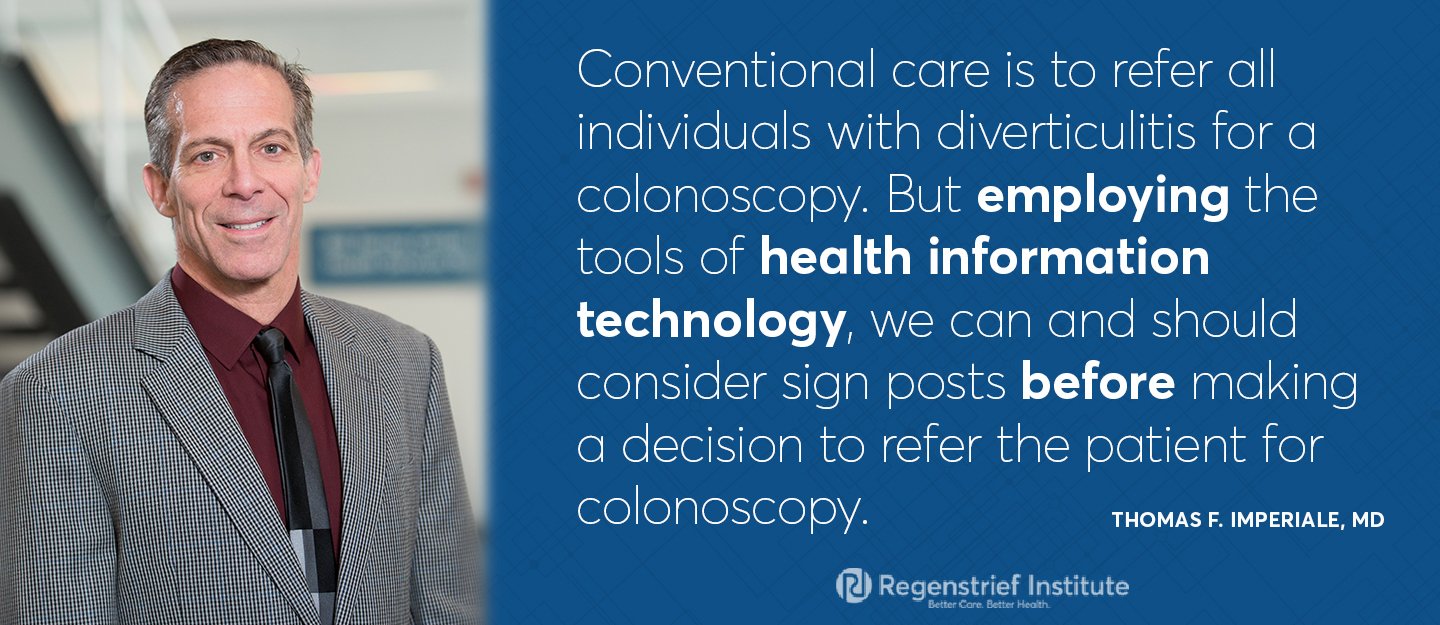Colonoscopy shouldn’t be automatic for patients after an episode of diverticulitis
An editorial challenges physicians and the U.S. healthcare system to reconsider the current “one size fits all” care for diverticulitis and to employ a precision medicine approach to determine which patients should be referred for colonoscopy.
The editorial, by Regenstrief Institute research scientist Thomas F. Imperiale, M.D., the Lawrence Lumeng Professor of Gastroenterology and Hepatology and Eddie Krajicek, M.D., a fellow in gastroenterology, both at Indiana University School of Medicine, highlights what they term “sign posts” to support individualized decision-making and strongly recommends their use.
“While national guidelines equivocate, conventional care is to refer all individuals with diverticulitis for a colonoscopy,” said Dr. Imperiale, who is a practicing gastroenterologist. “But employing the tools of health information technology, we can and should consider sign posts – such as the specific nature of the diverticulitis episode, preceding changes in bowel habit or other symptoms, personal and family medical histories, the dates and findings of previous colonoscopies – before making a decision to refer the patient for colonoscopy.
“While an episode of diverticulitis may be a sentinel event that brings someone who may have been avoiding routine screening into the doctor’s office and subsequently gets them into the colonoscopy suite, many patients who are automatically referred for a colonoscopy may not need one, which wastes colonoscopy resources. Taking a personalized, precision medicine approach uses healthcare resources wisely and provides better patient care,” he said.
If a patient’s primary care physician orders a colonoscopy without first asking sign post questions, Dr. Imperiale encourages patients to start a discussion to determine if colonoscopy is necessary.
The editorial, “Colonoscopy After Acute Diverticulitis: From Clinical Epidemiology to Clinical Management. Are We There Yet?” is published in the peer-reviewed journal Gastrointestinal Endoscopy.
What is diverticulitis?
Diverticulitis may follow diverticulosis, one of the most common medical conditions in the United States and other developed countries. Diverticulosis is a condition in which small pouches form and push outward through weak spots in the wall of the colon, the final portion of the intestinal tract. According to the National Institutes of Health, diverticulosis exists in about a third of U.S. adults age 50 or younger and more than half of people older than age 60. When one or more of these pouches becomes inflamed, the condition is called diverticulitis, which causes abdominal pain, usually with fever. A computed tomography (CT) scan of the abdomen is used to diagnose diverticulitis. There is no clear cause and effect relationship between diverticulitis and colon cancer.
About Regenstrief Institute
Founded in 1969 in Indianapolis, the Regenstrief Institute is a local, national and global leader dedicated to a world where better information empowers people to end disease and realize true health. A key research partner to Indiana University, Regenstrief and its researchers are responsible for a growing number of major healthcare innovations and studies. Examples range from the development of global health information technology standards that enable the use and interoperability of electronic health records to improving patient-physician communications, to creating models of care that inform practice and improve the lives of patients around the globe.
Regenstrief Institute is celebrating 50 years of healthcare innovation. Sam Regenstrief, a successful entrepreneur from Connersville, Indiana, founded the institute with the goal of making healthcare more efficient and accessible for everyone. His vision continues to guide the institute’s research mission.
About IU School of Medicine
IU School of Medicine is the largest medical school in the U.S. and is annually ranked among the top medical schools in the nation by U.S. News & World Report. The school offers high-quality medical education, access to leading medical research and rich campus life in nine Indiana cities, including rural and urban locations consistently recognized for livability.
About Thomas F. Imperiale, M.D.
In addition to his Regenstrief and IU School of Medicine appointments, Dr. Imperiale is a core investigator with the VA HSR&D Center for Health Information and Communication at the Richard L. Roudebush VA Medical Center and a member of the Indiana University Melvin and Bren Simon Cancer Center. He is also a practicing gastroenterologist whose clinical responsibilities include performing colonoscopies.











